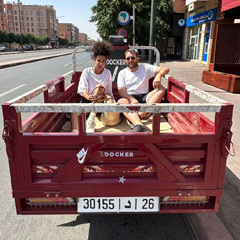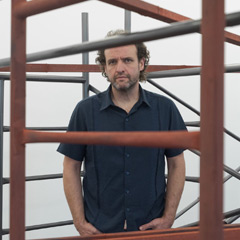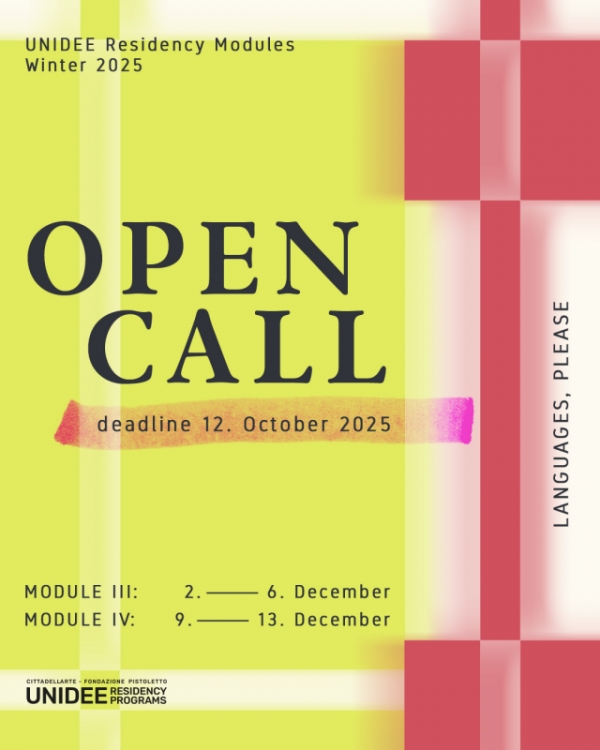UNIDEE Residency Modules: LANGUAGES, PLEASE / Winter Season 2025 / open call & selected residents
MODULE III
Autumn Ahn (US); Serra Bilgincan (TR); Celestino Marco Cavalli (IT); Maya Dikstein and Pedro Lago (BR); Zivile Fornari (LT/ES); Beatriz Freire (PT/ES); Hyeeun Go (KR/DE); Elitza Koeva (BG); Anita Lilic (RS/ES); Lucia Veronesi (IT); Paula Vidal (ES/DE); Joanna Wierzbicka (PL/GB).
MODULE IV
Gayuh Juridus Gede Asmara (ID/IT); Celestino Marco Cavalli (IT); Maria Cerdá Acebrón (ES/MX); Cemre Nomer (TR/CH); Ioanna Gerakidi (EL); Catalina Gómez (CO/SE); Piyush Kashyap (IN); Lynn Kodeih (LB/CA); Joanna Pottle (US/PL); Eleftheria Tzirki (CY); Valentina Vella (IT/NL); Julie Wills (USA).
______
UNIDEE Residency Programs and Fondazione Pistoletto Cittadellarte are pleased to announce an open call for applications for the modules of the winter season of the programme Languages, Please, curated by UNIDEE Visiting Curators Nina Fiocco and Gaia Martino.
Languages, Please is an invitation to a collective series of rehearsals that explores languages as geopolitical spaces of dispute, narratives, and encounters. It is a call to engage with the porosity of our bodies in action and the narratives that can infuse and strengthen our practice of remaining polyphonic, amid the crumbling circumstances of the present.
To meet in a language embraces the paradox of feeling foreign but inside the language, consciously rejecting to be bound by borders and rules that the language itself may impose. The fragility and fleeting temporality of this process embody the very essence of the community as a political space: a plurality of possibilities forged by the acceptance of implicit differences and affective responses that sharing a language fosters in each of us. What is incomprehensible yet invisible—uncoded, unseen and unheard—is just as vital as what is comprehensible and visible. Moving beyond the individual existence as an isolated experience, our human and more-than-human bodies are constantly engaged in negotiating ecological relationships to defend our right to remain plural, precarious and complex. This is a call to delve into what it could mean to engage with sustainable acts of storytelling, reception, and the reclamation of spaces of coexistence—an ongoing, heterogeneous multiplicity of stories so far, in which collective imaginaries emerge from the reorganisation of the senses, rewriting and acting for justice, rather than from resonance or empathy. It is about breaking the habit of synthesis, shifting our attention from the stories that worlds tell us to the intricate micro-processes that compose these stories—memories, muscles, and multiple interwoven connections occurring at once.
The UNIDEE Modules programme is a short-term residency format for selected residents. Participants will have the opportunity to cohabit at Cittadellarte and engage in an immersive, week-long residency, delving into their ongoing practice alongside peers, invited mentors, and guests. Discursive and material frameworks will intertwine, fostering a dynamic space where collective practice unfolds. Each module is interwoven within the 2025-2026 Modules program, threading together the fabric of Languages, Please.
To learn more about the project's context and objectives, please refer to the complete curatorial framework here.
Module III – Writing Patterns: a proposal for divergent genealogies will take place from 2 to 6 December 2025, and it is led by mentors Zineb Achoubie and Lorenzo Sandoval.
The workshop focuses on the questioning of the notion of writing. Text has been understood often mainly in its form of alphabetically inscribed system. Through different frames, this proposal introduces a variety of forms of writing: from the oral to the body movements, from the inscriptions in architecture to the configurations of textiles and patterns in ceramics, from sound to storytelling, the workshop explores practices that offer a counter-notion to the idea of text. Through that challenge of text, the proposal seeks to expand the notion of text into weaving, notation systems, and pattern making into understanding the multiple threads of knowledge production and memory inscription. The workshop focuses in interconnected genealogies: the first is the long term mutual influences between Andalucian cultures from different shores of the Mediterranean (on which Achoubie and Sandoval have been working about the last years); the second is the Amazigh forms of inscription (following Achoubie’s study of signs in Amazigh tattoos and textiles); and the third is the translations from craftsmanship into industrial systems of fabrication, focusing on textile in South Europe (which Sandoval has been researching about). Within these technical processes, the proposal will bring them together in relation to systems of accumulation or redistribution in those specific contexts.
During the days of the workshop, the participants will explore these notions combining different activities together. Practical and theoretical approaches will be introduced by combining weaving and reading references simultaneously, while engaging in conversation, watching films and introducing some exercises.
Module IV – “Word–Barricade: Distracting Language” will take place from 9 to 13 December 2025, and it is led by mentor Mauro Giaconi.
The workshop “Word–Barricade: Distracting Language” proposes a collective exploration of
languages in a state of clandestinity, understood as strategies of resistance and political transformation. We will start with a series of reflections and practical exercises around visual languages as tactics of illusion, confusion, and simulation, where creativity and imagination act as means to alter the perception of reality and imagine emancipatory and porous ways of inhabiting art as a political tool.
The workshop draws on historical and cultural references in which language became a device of resistance: secret anarchist codes, immigrant urban slang, dances that conceal combat training, metaphors as arsenals, fake funeral processions to occupy cities, and the invention of languages from within dungeons.
These examples will serve as points of departure for thinking about language in its clandestine and collective dimensions, activating a common imaginary capable of proposing alternatives to reality. Based on the backgrounds of the participants, the space will be structured as an open encounter for learning and experimentation, in which drawing, cooking, and linguistic invention exercises will be used to construct a possible collective and temporary language. Individual practice will be understood as a starting point for imagining complicities, codes, and dynamics of mutuality that allow us to expand the limits of communication and artistic thought.
We aim to invite a group of up to 12 residents to take part in each module. The programme is open to international participants of all backgrounds, whose engagement sits anywhere across the broad spectrum of cultural practice and research, with no restriction regarding disciplines, media or methodologies of work. Applications from artists, musicians, performers, curators, storytellers, writers, theorists, designers, activists, all are welcome and encouraged. We welcome applications from both individuals and collectives. If applying as a collective, please specify the number of participants and the nature of your collaborative practice.
The selection of participants will be guided by the resonance between the poetics, concerns, and inquiries present in the applicant’s work and those articulated by the curatorial framework of the UNIDEE Residency Modules 2025-26, and the core themes of each module. Additionally, consideration will be given to the applicant’s interest to contribute to a program-based residency rooted in processes of active exchange and participation.
The Residency Modules will take place at Fondazione Pistoletto Cittadellarte, in Biella, Italy.
The UNIDEE and Cittadellarte spaces will host a large part of the programme, while further opportunities for exploring the urban and rural landscape of Biella and its immediate surroundings will be offered.
Participants will be accommodated within the premises of Cittadellarte, in single rooms equipped with bedding and towels, and with the use of shared bathrooms. In case of participation in the workshop as a collective, they will be accommodated in a shared room. The residential spaces offer basic cooking facilities and communal resting areas. Arrival is expected in the afternoon on the day before the module begins, with departure scheduled for the afternoon of the day following the module’s conclusion. We are happy to welcome participants with children and/or small pets, ensuring a comfortable and inclusive environment for all.
We are committed to meeting to the best of our ability any accessibility requirements an attendee may have; this will be discussed individually with prospective residents.
N.B: English will be the common ground for interaction within the residency module, yet the work will not be confined to it. Languages will be approached as open territories, and participants will be invited also to engage with expanded, non-codified forms of communication, hybrid languages, and multiple configurations of interaction shaped by backgrounds, interests, and practices of all individuals within the group.
Further information regarding practicalities and FAQ available here.
To ensure sustainability to the UNIDEE Residency Module Programs, the participation fee follows a participatory method: each selected resident contributes with a fee based on their financial context, monthly income, and personal circumstances at the moment of the module. The suggested fee is 280 euros per module, covering accommodation at Cittadellarte and administrative expenses. After the selection process, participants will be invited to share their proposed contribution.
A limited number of partial bursaries to cover travels are made available to those who would not otherwise be able to participate. Please make sure to indicate in your application if you wish to be considered for this opportunity.
Residents will be required to arrange and cover expenses for their travel to/from Biella and for the food/living costs whilst in Cittadellarte.
The team at UNIDEE remains at your disposal to support you in the visa application process and to offer guidance and recommendations with travel arrangements. Additionally, the team will provide you with any documents you may need should you decide to pursue other funding opportunities through your local art councils or via international platforms / funding bodies.
We accept applications through https://form.jotform.com/252574671094362, which includes detailed instructions for the application process. Applicants will receive a confirmation email once their submission has been successfully received.
Please note: Applicants must indicate their choice of one of the two modules and tailor their response accordingly. If they wish to apply for both modules, two separate applications, each appropriately written, are required.
Deadline for submissions is 12 October 2025, 23:59 (CEST).

Zineb Achoubie, a Beaux-Arts College graduate in interior design, transitioned into weaving after two years in the field. Her journey continued at the Royal Academy of Traditional Arts, where she explored the rich tapestry of Amazigh culture through dedicated research since 2018. Currently, she manages a weaving cooperative in the High Atlas. Zineb Achoubie has been working on national and international art scenes through exhibitions and participation in art projects. Her research is focused on gestures, materials, and colors link to the traditional technologies of textiles making and the performative aspects around them, like storytelling and sound. Achoubie is the founder of Azur, a Moroccan textile laboratory bringing heritage and ancestry in relation with contemporary culture production.
Lorenzo Sandoval operates as an artist, filmmaker and curator. His practice spans different disciplines, creating spaces for encounter through his art works, films, architectural pieces and collaborations. He researches on the connections between textiles, computation and image production, in relation with systems of redistribution within the long-term project Shadow Writing which has been featured at IVAM Alcoi (2019) or Kindl in Berlin (2023) among others. With Tono Vizcaíno, they presented “Industria. Matrices, tramas y sonidos” at IVAM in 2021. He was part of “Here History Began. Tracing the Re/Verberations of Halim El-Dabh” at SAVVY Contemporary in 2021 and “Canine Wisdom for the Barking Dog. Exploring the sonic cosmologies of Halim El Dabh” at Dak’art Biennale 2018. Sandoval was part of the Miracle Workers Collective representing Finland in the Venice Biennale 2019. In 2018, started the research for his current film and art project “Aquel Verano del 22”, exploring the connections between mining in La Unión, construction in La Manga and agroindustry in Mar Menor, in relation to the rights of nature. Since 2023 Sandoval and Zineb Achoubie are developing the project “The Book of Threads”. In 2015, he founded The Institute for Endotic Research (TIER).
 Mauro Giaconi (Buenos Aires, Argentina, 1977)
Mauro Giaconi (Buenos Aires, Argentina, 1977)
He graduated from the Prilidiano Pueyrredón National School of Fine Arts (E.N.B.A.P.P., Buenos Aires, Argentina). He has lived and worked in Mexico City since 2011, where he works as a visual artist and independent cultural projects coordinator.
His artistic production explores, through different media such as drawing, graphic intervention, sculpture, and installation, the tension between the real and the apparent. His recent interests focus on appearance and simulation as strategies of resistance, survival, and power, from which he proposes fractures to visual, historical, and political conventions.
His work has been included in renowned national and international publications; he has participated in various international artist residencies and has exhibited in museums and institutions in America and Europe.
At the same time, he works as an independent cultural manager. He is the founder and director of projects such as Obrera Centro, a space for the artistic community to meet and explore creativity, and HerratecA, a community for lending tools, trades, and knowledge that operates like a public library, but for tools; both are located in Mexico City.
At the same time, he works as an independent cultural projects coordinator. He is the founder and director of projects such as Obrera Centro, a space for the artistic community to meet and explore creativity, and HerratecA, a community for lending tools, trades, and knowledge that operates like a public library, but for tools; both are located in Mexico City.
In the field of education, he coordinates independent artistic training projects, such as Proyecto Imán, seminars on the analysis of artistic work and production, and DibujE, a study group on drawing in contemporary art, among others.
Since 2025, he has been a member of the National System of Art Creators (SNCA).
